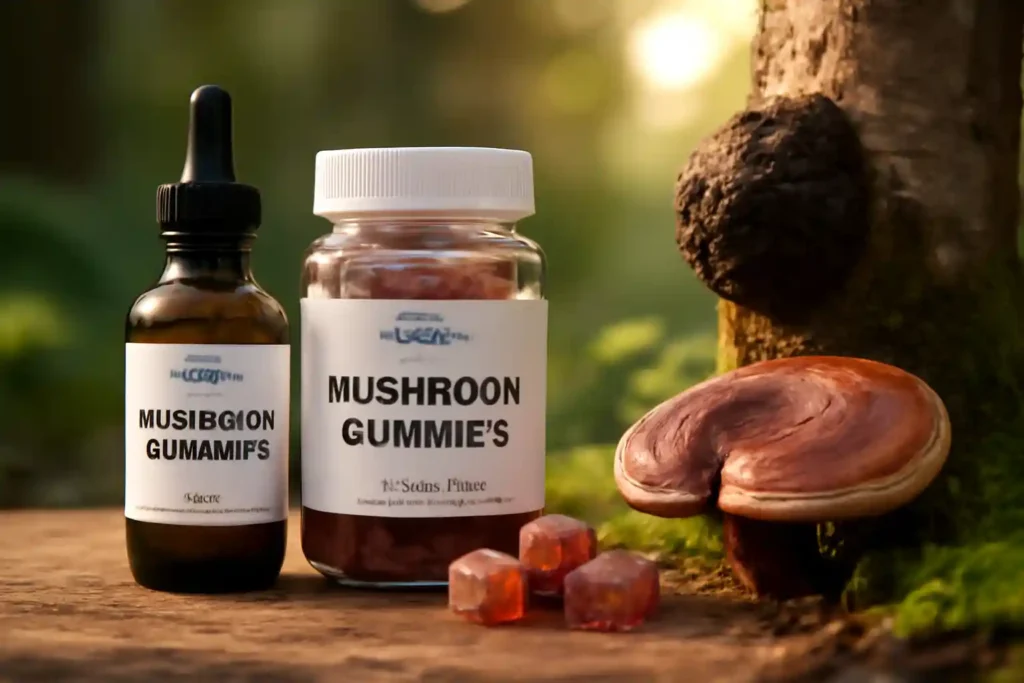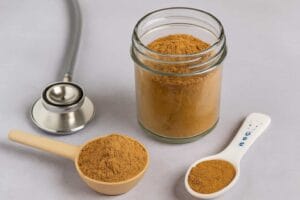In the ever-growing world of natural wellness, mushroom supplements have carved a unique niche for themselves. Among the popular options, consumers often find themselves weighing the pros and cons of different formats. If you’re curious about the best way to incorporate medicinal mushrooms into your routine, understanding the differences between Mushroom Gummies vs Mushroom Tinctures for Health Benefits is essential. Both forms offer unique advantages and potential drawbacks, and this guide will help you make an informed choice tailored to your wellness goals.
For those interested in energy and stamina, you might also want to explore our detailed comparison of Mushroom Gummies vs Cordyceps for Energy and Stamina.
Mushroom Gummies vs Mushroom Tinctures for Health Benefits: An In-Depth Comparison
When it comes to choosing between mushroom gummies and tinctures, understanding their distinct characteristics is key. Both are derived from potent medicinal mushrooms like reishi, lion’s mane, chaga, and cordyceps, but they differ in preparation, absorption, convenience, and overall experience.
What Are Mushroom Gummies?
Mushroom gummies are chewable supplements infused with mushroom extracts, often combined with natural sweeteners and flavorings to make consumption enjoyable. They are designed for ease of use, appealing especially to those who dislike swallowing pills or the taste of raw mushroom extracts.
What Are Mushroom Tinctures?
Mushroom tinctures are liquid extracts made by soaking mushrooms in alcohol or glycerin to draw out their active compounds. These concentrated drops can be taken directly or added to beverages, offering rapid absorption and customizable dosing.
Comparing the Health Benefits: Bioavailability and Potency
The core of the Mushroom Gummies vs Mushroom Tinctures for Health Benefits debate often boils down to how effectively your body can absorb and utilize the medicinal compounds.
- Bioavailability: Tinctures generally have higher bioavailability because the liquid form allows for faster absorption through mucous membranes under the tongue or in the digestive tract. Gummies, while convenient, must be digested first, which can delay or reduce the absorption of active ingredients.
- Potency: Tinctures tend to be more concentrated, delivering a higher dose of beneficial compounds per serving compared to gummies, which may contain fillers and sweeteners that dilute the potency.
Convenience and Taste: Which Fits Your Lifestyle?
While tinctures might offer superior potency, gummies shine in terms of convenience and palatability. In fact, the Mushroom Gummies vs Mushroom Tinctures for Health Benefits comparison often comes down to personal lifestyle — whether you prefer the quick, flavorful ease of gummies or the customizable precision of tinctures.
- Ease of Use: Gummies are perfect for on-the-go supplementation without the need for measuring or mixing. They’re also discreet and easy to carry.
- Taste: Many users find the earthy bitterness of tinctures off-putting, whereas gummies mask this flavor with natural sweetness and appealing textures.
- Dosing Flexibility: Tinctures allow for precise dosing by adjusting the number of drops, which can be critical for therapeutic use. Gummies come in fixed doses, which may not suit everyone’s needs.
Safety and Shelf Life Considerations
Both forms are generally safe when sourced from reputable brands, but there are a few nuances to consider:
- Preservatives and Additives: Gummies often contain sugars, gelatin, or vegan alternatives, along with preservatives to maintain freshness. Tinctures typically rely on alcohol as a natural preservative.
- Shelf Life: Tinctures usually have a longer shelf life due to their alcohol base, often lasting several years if stored properly. Gummies may have a shorter shelf life and require more careful storage.
- Allergies and Dietary Restrictions: Gummies may not be suitable for those with allergies to common ingredients like gelatin or certain sweeteners, whereas tinctures are generally free from these concerns.
Choosing the Right Mushroom for Your Health Goals
Not all mushrooms are created equal, and the type of mushroom extract you choose can influence which format is best. For example, if cognitive health is your priority, you might want to compare options like lion’s mane gummies versus tinctures. For a detailed comparison, check out our guide on Mushroom Gummies vs Lion’s Mane Mushroom for Cognitive Health.
| Mushroom Type | Common Benefits | Recommended Form | Notes |
|---|---|---|---|
| Reishi | Immune support, stress relief | Tincture | Highly potent in tincture form; ideal for therapeutic use |
| Lion’s Mane | Cognitive function, nerve regeneration | Gummies or Tincture | Gummies preferred for daily cognitive support; tinctures for higher doses |
| Cordyceps | Energy, stamina | Gummies | Gummies offer convenient energy boosts; tinctures for athletic performance |
| Chaga | Antioxidant, inflammation reduction | Tincture | Best absorbed via tincture; earthy flavor may require masking |
Which One Should You Choose? Final Thoughts on Mushroom Gummies vs Mushroom Tinctures for Health Benefits
Ultimately, the decision between mushroom gummies and tinctures depends on your personal preferences, lifestyle, and health objectives. If you prioritize convenience, taste, and ease of use, gummies are an excellent choice. However, if you seek maximum potency, faster absorption, and flexible dosing, tinctures may better serve your needs.
It’s also worth considering a combination approach—using tinctures when you need a concentrated dose and gummies for daily maintenance. Whichever you choose, ensure your supplements come from reputable sources with transparent ingredient lists.
F.A.Q
What are the main differences between mushroom gummies and tinctures?
Mushroom gummies are chewable supplements with pre-measured doses and a sweeter taste, while tinctures are liquid extracts typically more potent and absorbed faster. The choice depends on convenience versus potency.
Are mushroom tinctures more effective than gummies for health benefits?
Generally, tinctures offer higher bioavailability and potency, making them potentially more effective. However, gummies provide consistent dosing and are easier to incorporate into daily routines. The best option depends on individual needs and preferences.
Can I use mushroom gummies and tinctures together?
Yes, combining both can be beneficial. Tinctures can deliver a strong dose when needed, while gummies can maintain steady supplementation. Just ensure you don’t exceed recommended daily amounts.
Do mushroom gummies contain added sugars or allergens?
Many mushroom gummies include natural sweeteners and may contain gelatin or vegan alternatives. Always check labels for sugars, allergens, or additives, especially if you have dietary restrictions.
What are mushroom tinctures and their potential health benefits
Mushroom tinctures are concentrated liquid extracts made by soaking medicinal mushrooms in alcohol and water to draw out their beneficial compounds. Historically valued by ancient Greeks, Romans, and Chinese healers, these tinctures are now used to support immune, brain, and heart health, boost energy, and reduce inflammation. According to the American Pharmacists Association, mushrooms contain polysaccharides and antioxidants that offer anti-tumor, anti-inflammatory, antimicrobial, and antidiabetic properties. Read the full article on Pharmacist.com Mushroom Tinctures



